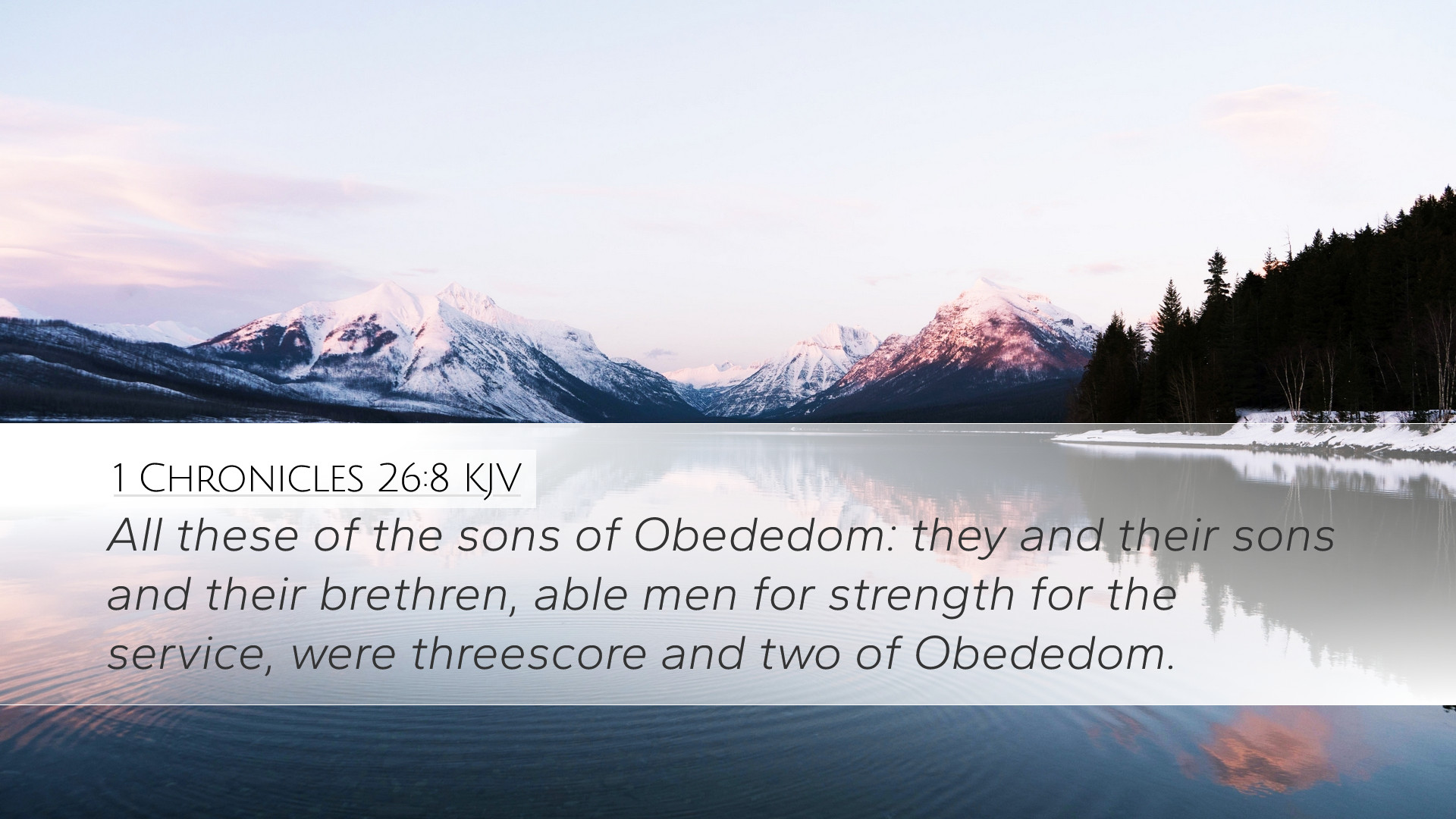Commentary on 1 Chronicles 26:8
Verse Reference: 1 Chronicles 26:8 - "All these of the sons of Obed-edom; they and their sons and their brethren, able men for strength for the service, were threescore and two of Obed-edom."
Introduction
This verse is situated within the broader context of the organization of the Levites and the temple service. It details the descendants of Obed-edom, a man who played a pivotal role in the preservation of the Ark of the Covenant. This commentary compiles insights from various public domain resources to provide a thorough understanding of the spiritual and practical implications of the text.
Contextual Analysis
The chapter focuses on the duties assigned to various families of the Levites concerning the temple's management. Obed-edom, a Gittite, had been blessed for housing the Ark, which speaks to God’s providence and favor. The list in this verse emphasizes not just the numbers but the competency and strength of the individuals involved.
Insights from Commentators
Matthew Henry
Matthew Henry highlights the significance of Obed-edom's descendants. He notes that their qualifying characteristics, which included strength for service, were not merely physical attributes but also an indication of their spiritual robustness and readiness to serve God. Henry points out that it is crucial to consider the role of families in worship and ministry, suggesting that the strength of the church is often rooted in the strength of its families.
Albert Barnes
Albert Barnes discusses the number highlighted in this verse – sixty-two of Obed-edom’s kin. He underscores that the number indicates a substantial capacity for duty and service in the temple. Barnes mentions that this demonstrates God’s blessing upon Obed-edom for his previous faithfulness. His commentary brings forth the idea that God not only entrusts tasks but also equips individuals and families for holy service, thereby enhancing the community of faith.
Adam Clarke
Adam Clarke provides a more detailed look at the roles of the Levites, focusing on the historical context. He indicates that Obed-edom was originally a Philistine who became a worshiper of the God of Israel, serving as a symbol for the inclusivity of God’s grace extending beyond natural lineage. Clarke emphasizes that this change of status reflects God's willingness to honor those who draw near to Him and commit their lives to His service.
Theological Implications
- The importance of family in ministry: This verse clearly illustrates the involvement of Obed-edom's entire household in temple service, reinforcing the biblical principle of generational faithfulness.
- Divine blessing through obedience: The growth of Obed-edom's family in number and capability is reflective of God's blessing resulting from obedience and faithfulness.
- Strength for service: The mention of being "able men for strength" suggests a holistic view of strength that includes both physical endurance and spiritual robustness, critical for the demands of temple service.
Practical Applications
- Encouragement for church leaders: This passage serves as motivation for pastors and church leaders to develop ministries that engage families, recognizing the strength of collective worship and service.
- Call to equip the faithful: As God equips individuals for service, churches are encouraged to nurture and develop the gifts and capabilities of their congregants for various forms of ministry.
- Embracing transformative grace: The story of Obed-edom encourages congregations to recognize that anyone, regardless of past, can become a significant part of God’s work through faith.
Conclusion
1 Chronicles 26:8 is more than a mere registry of names and numbers; it is a testimony to divine favor, family involvement, and the empowered community of believers. It reminds modern readers of the importance of each member's contribution to God's work and the profound impact of living in obedience to God's calling. As pastors, students, theologians, and scholars study this text, may they uncover the rich blessings and responsibilities inherent to the community of faith.


